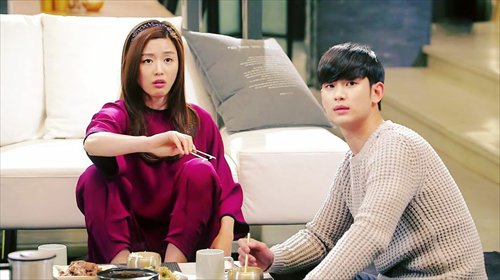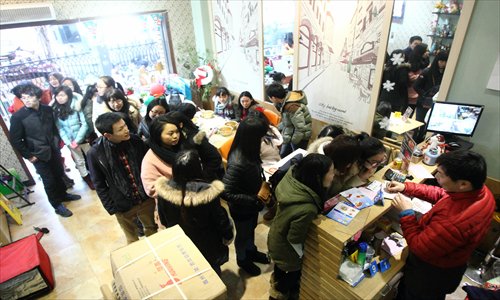Gotta have it

A scene from You Who Came From The Stars featuring actress Jun Ji-hyun and actor Kim Soo-hyun Photo: IC
Michelle He, a 26-year-old bank manager in Southwest China's Sichuan Province, used to buy lipstick from well-known brands such as Dior. But now she is more interested in a new brand that few Chinese consumers had even heard of before this year.
"I ordered this hot pink IOPE lipstick online and waited for more than a week for it to come," she told the Global Times Monday. "I paid 150 yuan ($24.25) for it. Now it is much more expensive on taobao.com, since so many people are going after it."
IOPE is a brand owned by South Korean cosmetics and skincare products maker Amorepacific Corporation. It became fashionable after a popular Korean TV drama, You Who Came From the Stars, had its lead actress using the lipstick in the show.
One of the characters in the show is a fashion-obsessed South Korean female superstar called Cheon Song-yi, who is played by Jun Ji-hyun. It also features an alien called Do Min-joon, performed by Kim Soo-hyun. They fall madly in love, even though Do has to return to his home planet within three months.
The romantic comedy, which started in late December and aired for two months, was a massive success in TV ratings.
It was also a big commercial success for products featured in the show, ranging from fashion items to snacks, many of which have sold out since early February.
Get the lipstick
According to an old Chinese saying, love for a person extends even to the crows on his roof. Chinese viewers' love of the show apparently goes beyond the characters and story, and includes the cosmetics that Cheon uses.
Li Xiaotian, who runs a store selling South Korean and Japanese skincare products and cosmetics on e-commerce website taobao.com, told the Global Times Monday that her business partner in Seoul could not purchase IOPE lipstick in the city because it was all sold out.
"Many customers asked me about the hot pink and red colors of the lipstick," said Li, who lives in Central China's Hunan Province. "Even the hair sprays and finishing cream, which were simply placed on Cheon Song-yi's dressing table, became extremely popular in South Korea and China," she said.
The lipstick was also sold out on taobao.com and even US websites selling Asian cosmetics. All the taobao.com shop owners contacted by the Global Times Monday said a customer now needs to wait at least 10 days before they ship the product.
"My colleagues will travel to Seoul this week just to buy the lipstick," one salesperson told the Global Times Monday.
Most Korean drama aficionados in China buy their Cheon-style lipstick online, because IOPE does not have an official store in the country. The lipstick, which is priced at around $25 in the US and South Korea, the equivalent of 153.64 yuan, can fetch as much as 300 yuan on taobao.com.
Li started selling IOPE blemish balms, one of which Cheon picked up and put in her purse in one of the episodes, for 188 yuan since January. Li said she has made nearly 30,000 yuan in profit from it so far.
Since December 18, when the drama premiered, the share price of Korea-listed Amorepacific has surged by 16.3 percent to 1.16 million won ($1,082.25) as of Wednesday.

Customers line up at a Korean-style fried chicken resturant in Hangzhou, East China's Zhejiang Province on February 19. Photo: IC
Now eat the food
The lipstick may have sold out, but the show's fans have other ways to spend money on their passion, such as shoes.
He, for example, said she is saving up 4,000 yuan to buy a pair of silver Jimmy Choo shoes like those that Cheon wore to attend a wedding.
A Shanghai-based fashion columnist with the handle gogoboi on Weibo has written regular posts about what Cheon and Do wear in the show, ranging from Dolce and Gabbana dresses to Didier Dubot earrings. His entries on the show have been reposted 2,000 to 12,000 times each.
Those who are not willing to spend thousands of yuan on designer brands are instead lining up outside restaurants that serve the South Korean-style fried chicken and beer which Cheon and Do like.
Liang Jinjing, general manager of Barsak, a fried chicken restaurant in Beijing, told the Global Times Tuesday that the restaurant's revenues have rocketed since late January, declining to give specific numbers.
"Several groups of customers said to me without looking at the menus, 'did you see You Who Came From the Stars? I just want what Cheon Song-yi and Do Min-joon had in the show,'" he said.
Meanwhile, in China…
Unlike Korean dramas, Chinese TV shows rarely create a fad for any products.
Wang Danqing, a partner at Beijing-based ACME consultancy, told the Global Times Tuesday that advertisements are always planted in Chinese dramas in a way that is too intrusive.
"The products [in Chinese dramas] are usually placed in a prominent position with the logo facing the camera," Wang said. "The obvious advertisement cannot raise the audience's interest in buying the product."
The advertisements, known as product placements, in the recently aired fourth season of a popular Chinese show, Love Apartment, were so obvious that they were widely mocked by Web users. In one episode, a female role held a bottle of facial cream and read the effects of the product word-by-word to another character.
Yang Yang, an analyst at Beijing-based entertainment consultancy Entgroup, told the Global Times Tuesday that You Who Came From the Stars was so successful partly because Cheon rarely showed the logo of the products.
"That makes the audience want to proactively search for the products after the show," Yang said. "Chinese dramas' repeated showing of brand logos in protruding ways reduces the perceived value of the products."
Another reason for the Korean drama's success in promoting fashion items is its generous spending on Cheon's and Do's outfits, Yang said.
"Chinese production teams invest most of their money on the actors' and actresses' salaries, which forces them to reduce the spending on props and clothes," she said. "The apparently cheap products cannot set a fashion trend, and the viewers will not buy such products because of the show."
Chinese production teams should learn from those in the US and South Korea, which film later parts of the show as its earlier part is being aired. That makes it easier for them "to interact with viewers, find out which characters are popular, and make product placements that are tailored to the audience's taste," he said.